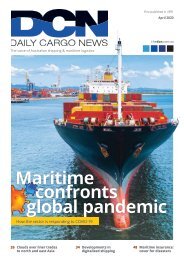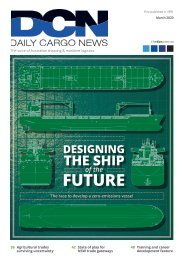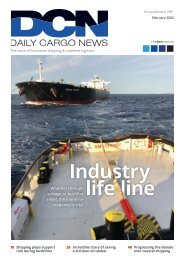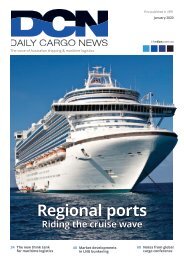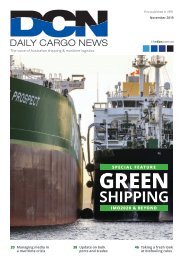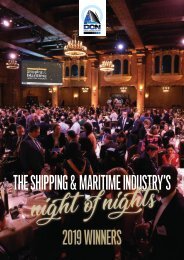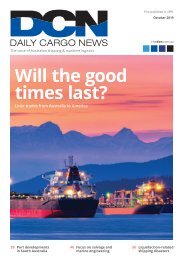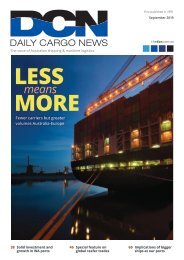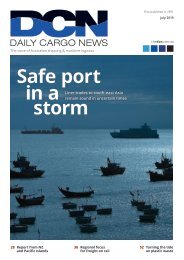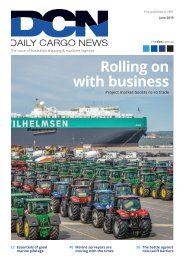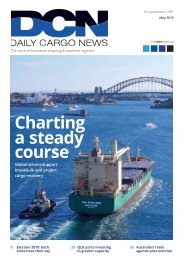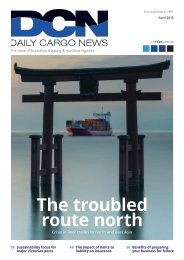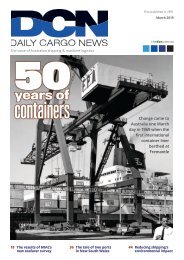DCN0718_Combined_150
Create successful ePaper yourself
Turn your PDF publications into a flip-book with our unique Google optimized e-Paper software.
COASTAL SHIPPING<br />
POLICY SETTINGS CRUCIAL TO REVITALISE THE COASTAL FLEET<br />
Change to current coastal shipping laws have to be the right changes, writes Teresa Lloyd<br />
The need for certainty and stability<br />
of coastal shipping policy settings<br />
in Australia remains critical. Do the<br />
current cabotage arrangements need to<br />
be changed? Yes, they do.<br />
There are currently 50 vessels that<br />
hold a General Licence. That’s probably<br />
a lot more than anyone realised. But<br />
the detail is important. They are: eight<br />
vessels that work in/across Bass Strait;<br />
five dry bulk carriers; five expedition<br />
cruise vessels; one research vessel; 31<br />
servicing northern Australia including a<br />
large number of landing barges. Suffice<br />
to say, the activity of these General<br />
Licence vessels is not preventing<br />
the presence of the foreign-flagged<br />
shipping in coastal trades.<br />
However, it is recognised the process<br />
for obtaining a temporary licence to<br />
work on the coast can be a deterrent.<br />
There are simple fixes to maximise<br />
use of the blue highway and remove<br />
red-tape burdens. These process<br />
improvements are clearly described in<br />
the green paper released in 2016 (mial.<br />
com.au/our-work/coastal-tradinggreen-paper)<br />
and would result in<br />
almost all voyages being undertaken<br />
with the bare minimum of paperwork<br />
and approvals. Most would not even<br />
require an application, far less a<br />
variation, under the proposals put<br />
forward. And, this is possible precisely<br />
because the vast majority of coastal<br />
shipping is undertaken by foreign ships.<br />
Importantly, these changes can<br />
liberate the vast majority without<br />
destroying the fabric of the regime<br />
that offers fair and reasonable checks<br />
and balances for what is left of the<br />
Australian industry. Why hasn’t<br />
this already been done? Failure to<br />
progress change sits squarely with<br />
the proponents of the proposal put<br />
forward by the government. MIAL has<br />
clearly identified the need for a radical<br />
change in the approvals process and<br />
yet the government proposal went<br />
nowhere near far enough in removing<br />
red tape for the voyages where there<br />
is no Australian ship (which is almost<br />
all voyages) and too far in terms of<br />
undermining the integrity of the regime<br />
in terms of tolerances for the few<br />
voyages where it does matter.<br />
Coastal voyages by foreign ships<br />
could be free of application and<br />
variation processes today had the<br />
proposals been properly considered<br />
and drafted – and it is a great shame<br />
this is not the case. But all this is really<br />
tinkering at the edges. A desire for change<br />
beyond the paperwork and processes has<br />
been expressed continually for years by<br />
the full range of impacted stakeholders.<br />
PRAGMATISM<br />
What is very apparent is that after all<br />
this time, there is no genuine desire for a<br />
solution because many parties involved<br />
remain unwilling to be pragmatic. The<br />
way forward cannot be to the benefit of<br />
only one party; there must be a way to<br />
accommodate all interests. Pragmatism is<br />
the only way.<br />
Australia needs a clear vision to create<br />
a stable and sustainable coastal shipping<br />
policy. Such a vision needs to tackle the<br />
core questions:<br />
• What maritime capability does the<br />
country need?<br />
• How will it be provided?<br />
• Who is going to pay for it?<br />
It is possible to design a regime that:<br />
• supports Australian businesses<br />
involved in providing shipping services;<br />
• provides users of shipping services<br />
with the service they need at a rate<br />
they can afford;<br />
• provides work for a strategic group<br />
of Australian maritime workers;<br />
• allows Australia to capitalise on the<br />
natural advantages it has to be a<br />
strong maritime nation with resultant<br />
benefits to the nation (economic<br />
and social)?<br />
Above: Teresa Lloyd,<br />
CEO, Maritime Industry Australia<br />
The government, as custodian of the<br />
national interest, can make this happen.<br />
We need to think differently about<br />
how Australia can maximise the natural<br />
advantages we have to be a shipping<br />
nation, particularly how we see our<br />
coastal shipping task working. It is time<br />
to start looking at new options such<br />
as the use of mini-ports and short-sea<br />
shuttle services.<br />
CABOTAGE<br />
As to the calls for cabotage to<br />
be abolished, as it is a form of<br />
protectionism, I say, “show me nation<br />
that doesn’t protect its shipping<br />
industry”. The nations that provide<br />
the ships to carry international cargos<br />
all incentivise their industry – in many<br />
cases to an extreme extent. The effect<br />
is precisely the same as protectionism,<br />
or cargo reservation. One person’s<br />
incentive is another person’s subsidy.<br />
There is no such thing as a level<br />
playing field in shipping – everyone is<br />
protected somehow, it’s just a matter<br />
of how. Tax breaks, international<br />
employment arrangements and<br />
other incentives go unremarked upon<br />
while cabotage or cargo reservation<br />
appear with flashing neon headlines.<br />
Australian shipping businesses don’t<br />
want cabotage necessarily, but they<br />
do want an equivalent to give them<br />
half a chance at competing with<br />
other nations that incentivise and/or<br />
subsidise their industry in their own<br />
country. As contributors to the national<br />
economy and employers of Australians<br />
both on shore and at sea, it makes<br />
sound economic sense to ensure these<br />
businesses have that opportunity.<br />
The opportunity still exists for<br />
Australia to choose what role we want<br />
our maritime industry generally, and<br />
coastal shipping sector in particular, to<br />
play. We are a maritime nation and we<br />
owe it to ourselves to retain some level<br />
of indigenous capability. To do this, we<br />
require strategic maritime skills to make<br />
our ports and blue highway workable<br />
and a few critical assets that can both<br />
train these people and be deployed as<br />
and when needed in the interests of<br />
Australian and its citizens.<br />
The government can and should<br />
provide the vision and the environment<br />
to make this happen and the industry<br />
players can and should be pragmatic in<br />
their support.<br />
Jim Wilson<br />
30<br />
First published in 1891<br />
July 2018 thedcn.com.au



